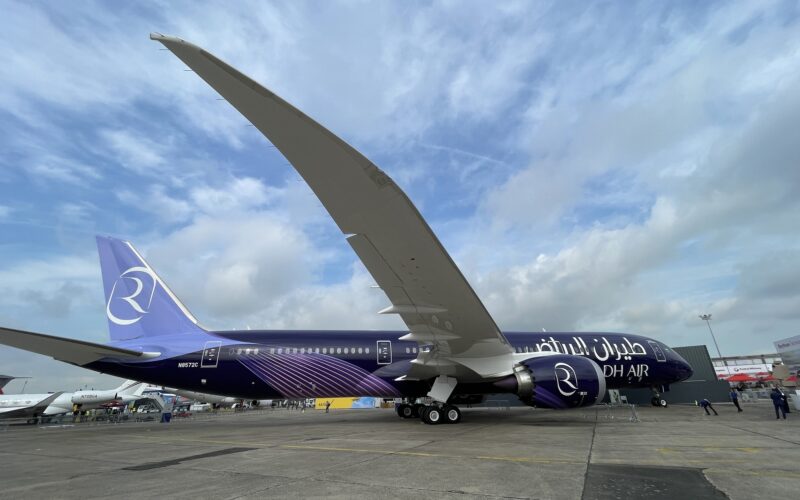Few, if any, new airline projects generate the degree of excitement and expectation that Riyadh Air has managed to draw in the few months since the project started to take shape.
To call Riyadh Air a “startup” may be a bit misleading, since the new Saudi carrier, which is expected to take to the skies in 2025, is backed by the financial might of the Public Investment Fund (PIF).
This investment institution is the vehicle through which the Kingdom of Saudi Arabia is backing a string of large-scale projects that aim to make the Middle Eastern country a tourism powerhouse able to host 100 million visitors per year by 2030.
Riyadh Air is called to play a major role in this vision, by enhancing the air connectivity of Saudi Arabia and making its capital a major air hub.
And the man selected to lead this gigantic enterprise is none other than Tony Douglas, who was at the helm of Abu Dhabi-based Etihad for half a decade.
AeroTime had the chance to speak with Douglas on the sidelines of the World Aviation Festival, which took place in Lisbon, September 26-28, 2023.
In a broad-ranging conversation, Douglas shared his vision for Riyadh Air and the Saudi air travel market, which he sees as being on the cusp of a massive wave of travel demand. According to Douglas, traffic to and from Saudi Arabia should, by itself, be enough to support the rise of a new major carrier in the region.
Douglas referred to the underlying facts and trends supporting this forecast, such as Saudi Arabia becoming the world’s fastest growing economy, a large and young population that is eager to travel, and a current lack of direct air connectivity to many of the world’s major cities.

He mentioned, as an example, a recent trip he undertook to one of China’s main economic centers, for which it was not possible to find a nonstop flight.
“For the world’s fastest growing economy this is totally unacceptable,” he said.
Douglas highlighted how, unlike nearby hubs such as Doha or Dubai, there is enough latent demand in Saudi Arabia to sustain those flights without having to necessarily rely on global connecting traffic.
“93% of traffic going into Riyadh right now is point-to-point,” he added.
Riyadh Air’s project also counts on Saudi Arabia’s tourism industry continuing to grow on the back of initiatives, such as the construction of new Red Sea resorts, the development of Al Ula, in the northwest of the country, as a major destination for international tourism, or even the appeal of football stars such as Cristiano Ronaldo and Neymar, who are now playing in the Saudi league.
“This year Saudi Arabia is the second most searched destination on the internet,” affirmed Douglas. “Even in a year, the progress has been phenomenal.”
Not entirely unexpectedly given its name, the new airline will be based in the Kingdom’s capital, Riyadh. From there, Douglas said Riyadh Air “will fly to all the obvious destinations in Europe, the eastern seaboard of North America, the capital cities of Central Europe, Central Asia, the Indian subcontinent, and the Far East, but also, very importantly, to the regional GCC cities and all major domestic destinations too.”
Douglas said he expected Riyadh to act as a transit point for many of those prospective tourists awaited by the proponents of Saudi Arabia’s megaprojects.
An important question going forward, is what will be the relationship between the new Riyadh Air and the existing national carrier, Saudia, which is owned by a different government-controlled entity.
Douglas clarified that the two carriers are going to be complementary. He explained that the Saudi landmass is as large as several major European countries put together.
“The flying time between Riyadh and Jeddah is similar to that between Lisbon and Rome,” he said, using a straightforward comparison to illustrate the point. “How many national carriers operate in the lands between Lisbon and Rome?”
He continued: “Even if they also operate out of Riyadh, Saudia has always been traditionally based in Jeddah and they will progressively focus more of their activities in that city. We are very much aligned, we will act as the two national carriers of the Kingdom.”
Riyadh Air will be a full-service carrier.
“We stand for three things: first, Riyadh Air is going to be an environmental thought leader, second, a true digital native, because we have no legacy and, third, we’ll have an obsessional attention to detail and guest experience, we will take it to the next level,” Douglas said. “Everything we’ll do will reflect that.”
Riyadh Air ordered 72 Boeing 787 Dreamliners in March 2023, but this is not going to be the final word when it comes to building up the fleet. Douglas confirmed that in the coming months, the airline is going to place a sizable order for narrowbody aircraft.
“It won’t be too far into the future until we make that decision quite clear [the narrowbody aircraft order – ed. note]. We will be building a fleet that is consistent with the kind of geographies I mentioned before, some 201 cities,” Douglas explained. “We are going to be one of the leading airlines in the region.”
“This is probably the biggest startup within two to three decades in the Middle East. This is a big, big startup,” he added proudly.
When asked about the links between Riyadh Air, PIF, and the different megaprojects currently underway in Saudi Arabia, Douglas referred to them all being part of “Team KSA, Team Kingdom of Saudi Arabia”. He added that “from the point of view of guest experience and the economic stimulus we provide, we are going to be as connected [to these other players in Saudi Arabia’s economy – ed. note] as we can be.”
The elephant in the room, in this case, is the dependency of the airline industry and the Saudi economy, in particular, on fossil fuels, and how it aligns with the stated goal of becoming a sustainability thought leader.
Douglas acknowledged the problem as well as the difficulty to wean the industry off oil.
“When I attended the IATA conference in Sydney in 2018, not that long ago, no one mentioned carbon reduction even once,” he said. “Two years later it was front and center. To me this is the first step: recognize the problem, get everyone to pull in the same direction.
“By definition, we’ll have the most modern and efficient fleet from day one and the reason we made the selection that we have done, and the one that we’re about to make, is based upon the performance of the next generation aircraft, with next generation engines and next generation flight guidance computers and engine management computers, which are, give or take, 20% more fuel efficient than previous generations.”
He continued: “What we’ll also do is communicate and educate a broader awareness of everything that is necessary for us to continue to reduce the carbon footprint of commercial aviation. We will also publish our first sustainability report before we’ve even done our first flight, as a demonstration of thought leadership and how we’re presenting ourselves.”

